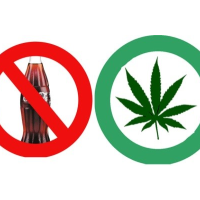Bad Election for Democrats, but not so Bad for Progressive Ballot Measures
 (Graphic: Steve Straehley, AllGov)
(Graphic: Steve Straehley, AllGov)
If there was a silver lining in Tuesday’s rather dark outcome for Democrats, it was the many progressive ballot measures embraced by voters around the country.
Some of the victories came in solidly Republican states. Voters in four conservative states—Alaska, Arkansas, Nebraska and South Dakota—adopted initiatives raising the minimum wage:
· Alaska’s minimum wage will go from $7.75 to $9.75 an hour in two years, with further increases based on inflation.
· Arkansas’ minimum wage will increase to $8.50 per hour over the next three years.
· Nebraska’s wage will bump to $9 an hour by 2016.
· South Dakota’s will rise from $7.25 to $8.50 by next year, with more raises based on inflation after that.
There were plenty of other victories celebrated by those on the left.
In Massachusetts, despite electing a Republican governor voters approved a measure guaranteeing paid sick days for workers. Three cities, Oakland, California, and Trenton and Montclair, New Jersey also approved similar laws for their jurisdictions.
California voters adopted Proposition 47, which downsizes possession of illegal drugs for personal use from a felony to a misdemeanor. It also de-felonizes theft, forgery, fraud and writing a bad check when the loss involves $950 or less in value.
Opponents of hydraulic fracturing also celebrated in three states where local communities approved bans on the controversial drilling. This included Denton, Texas, where fracking was born, according to Common Dreams. Other anti-fracking measures won in Athens, Ohio, and two counties in California: Mendocino and San Benito. However, another anti-fracking measure lost in Santa Barbara County after oil companies put millions into the fight.
Advocates for legalized marijuana were successful in Oregon, Alaska and Washington, D.C.
· Oregon’s law decriminalizes personal possession, manufacture and sale of marijuana for people 21 years of age and older. The measure also establishes a system for regulating the production, distribution and sale of marijuana.
· Alaska’s law will tax and regulate the production, sale and use of marijuana by people over 21.
· Washington, D.C.’s law allows those 21 and up to possess up to two ounces of marijuana for personal use and grow up to six cannabis plants at home. People can also transfer up to one ounce of marijuana to another person, but not sell it. However, the new Republican Congress will have the final say on the law.
Despite heavy opposition from the soft drink industry, voters in Berkeley, California, approved Measure D, which imposes a 1-cent-per-ounce general tax on sugary beverages and sweeteners used to flavor drinks.
Even gun control supporters had something to rejoice this week. Voters in Washington state adopted a tough gun background check law, Initiative 594, which extends background checks to private sales and transfers.
And in Hawaii, a ballot initiative that imposes a moratorium on the growing of GMO crops was approved in Maui County.
-Noel Brinkerhoff
To Learn More:
Minimum Wage Raise Passes In Four GOP States (by Dave Jamieson, Huffington Post)
Even In Some Red States, Voters Overwhelmingly Approve Paid Sick Days, Minimum Wage Hikes (by Brigid Schulte, Washington Post)
Prop 47: As California Goes, So Goes the Nation? (by Barry Krisberg, New America Media)
‘Just the Beginning’: Communities Across Nation Ban Fracking (by Andrea Germanos, Common Dreams)
Oregon, Alaska and Washington, D.C. Legalize Marijuana (by Dan Merica, CNN)
Nation's First Soda Tax Passes in Berkeley, Fails in San Francisco (by Lydia O'Connor, Huffington Post)
Voters Approve Measure To Expand Checks For Gun Buyers (by Joseph O’Sullivan, Seattle Times)
Maui County Residents Vote ‘Yes’ on GMO Initiative (Hawaii News Now)
Voters will Decide if California will become First State to Reduce All Drug Possession Crimes to Misdemeanors (by Noel Brinkerhoff, AllGov)
- Top Stories
- Unusual News
- Where is the Money Going?
- Controversies
- U.S. and the World
- Appointments and Resignations
- Latest News
- Trump to Stop Deportations If…
- Trump Denounces World Series
- What If China Invaded the United States?
- Donald Trump Has a Mental Health Problem and It Has a Name
- Trump Goes on Renaming Frenzy






Comments